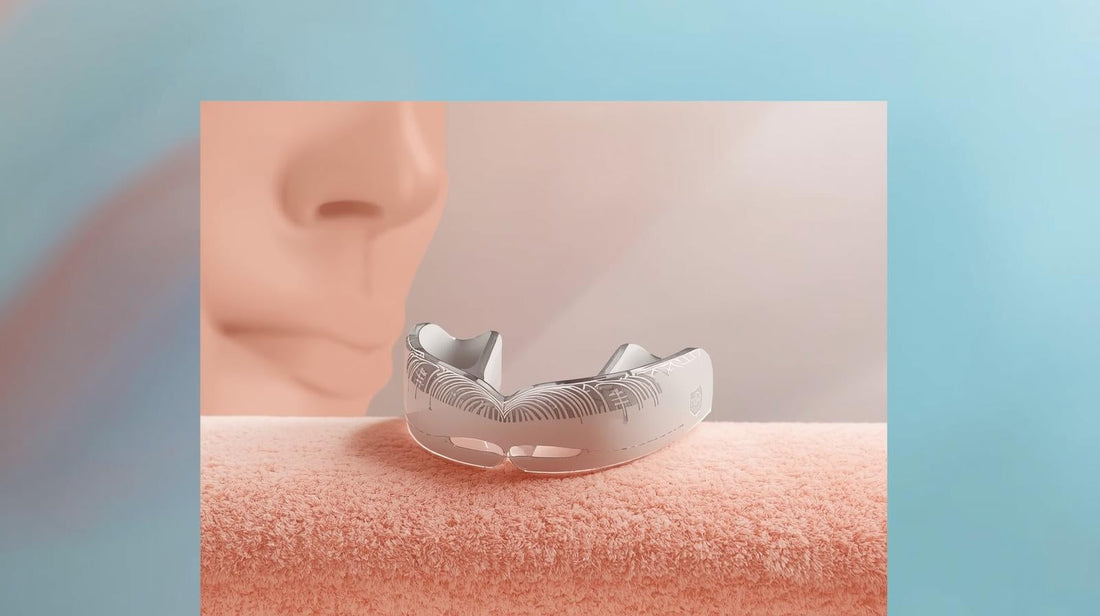
Are Custom Mouthguards Effective for TMJ Relief?
Share
I’ve tested them.
I’ve spoken with dentists, physiotherapists, and TMJ sufferers who’ve spent thousands on them.
And here’s the truth:
They can work — but not always the way you expect.
This post will break down the science, the hype, and the pitfalls so you can make an informed decision before spending a dime.
How Custom Mouthguards Help TMJ Sufferers
Custom mouthguards create a barrier between your teeth and subtly adjust your jaw’s resting position.
For many, this means:
-
Reduced teeth grinding (Read: Best Home Remedies for Night-Time Teeth Grinding)
-
Less strain on jaw muscles
-
Decreased morning headaches
Think of it like replacing a wobbly chair leg with a custom-fit block.
The goal isn’t just comfort — it’s stability.
The Science Behind Mouthguard Thickness and Jaw Alignment
Thickness matters.
Too thin, and it’s useless.
Too thick, and it can worsen your TMJ by forcing your jaw into an unnatural position.
Research suggests optimal thickness is 2–4 mm for TMJ relief.
For a deep dive, see The Science Behind Mouthguards: How They Alleviate Jaw Pain.
Comparing Custom vs. Store-Bought Mouthguards
Custom Mouthguards:
-
Made from dental impressions
-
Fit snugly to your bite
-
Cost $400–$1,200
Store-Bought (Boil-and-Bite):
-
Quick, cheap ($20–$50)
-
Less precise fit
-
Can cause uneven pressure
From my testing, a store-bought guard is fine for short-term relief.
But for long-term jaw alignment, custom usually wins.
See How Do You Know If You Need a Dentist-Designed Versus Store-Bought Mouthguard for Jaw Pain?.
Clinical Evidence: Mouthguards and TMJ Muscle Activity
Several EMG studies show mouthguards reduce muscle activity during sleep.
Less muscle activity = less inflammation.
Learn more in Are Mouthguards Effective for Reducing Jaw Tension?.
Mouthguard Use in Sports: TMJ Injury Prevention
Athletes use mouthguards for concussion and tooth protection.
An added bonus? They can prevent trauma that worsens TMJ.
See Mouthguards for Athletes: TMJ Prevention and Performance.
Fabrication Costs and Time: Is it Worth It?
Expect:
-
2–3 dental visits
-
1–3 weeks turnaround
-
High upfront cost
If your TMJ pain is severe and chronic, it’s worth considering.
For tech innovations making this process faster, see What Are the Latest Advancements in Custom Mouthguard Technology for TMJ Treatment?.
User Experiences: Relief With Custom Mouthguards
Some report overnight relief.
Others feel no change — or worse pain — if the guard was made without proper jaw posture assessment.
This is why bite analysis matters (My Bite Is Uneven — Will a Mouthguard Help?).
Choosing the Right Mouthguard for Your TMJ Needs
Ask your dentist:
-
Will this adjust my jaw position or just protect my teeth?
-
Can I test a temporary version first?
-
How will we measure success?
See How to Choose the Right TMJ Appliance for Your Needs.
Maintenance Tips for Prolonging Mouthguard Life
-
Clean daily with non-abrasive soap
-
Avoid hot water (warps shape)
-
Store in a ventilated case
For more troubleshooting, see How to Troubleshoot Common Oral Appliance Issues.
Are Double-Arch Mouthguards Safe for TMJ?
Double-arch guards are great for sports, but for TMJ?
Often too bulky.
They can force your jaw forward and worsen symptoms.
Common Mistakes When Using Mouthguards for TMJ
-
Using a sports guard for TMJ therapy
-
Ignoring poor fit
-
Not replacing worn guards
See How Does a Poorly Fitted Mouthguard Impact TMJ Symptoms?.
Long-Term Effects of Wearing Mouthguards
Pros:
-
Prevents tooth damage
-
Can reduce inflammation
Cons:
-
Doesn’t “cure” TMJ
-
May change bite if poorly made
Awareness of Protective Gear Among Athletes
Athletes know about mouthguards, but few link them to TMJ prevention.
This connection needs more awareness.
How to Get Fitted for a Custom Mouthguard
-
Book a dentist or TMJ specialist consult
-
Take impressions or 3D scans
-
Test a temporary version before finalizing
See Step-by-Step Guide to Fitting a Mouthguard for TMJ.
Mouthguards vs. Splints: Which Is Better for TMJ?
Splints can reposition your jaw.
Mouthguards mainly protect teeth.
The right choice depends on whether your TMJ stems from grinding, injury, or misalignment.
See What’s the Comprehensive Comparison Between Stabilization Splints, Repositioning Splints, and Advanced Custom Mouthguards for TMJ?.
FAQs
1. Do custom mouthguards really help TMJ?
Yes, for many — if fitted properly.
2. How long before I see results?
Anywhere from a few nights to weeks.
3. Can a bad mouthguard make TMJ worse?
Yes — poor fit can worsen pain.
4. Should I wear it all day?
Usually, only at night.
5. Does insurance cover it?
Sometimes — check your plan.
6. Can I adjust my own guard?
Not recommended.
7. Will it stop grinding?
It won’t stop the habit, but will protect teeth.
8. Are there non-mouthguard treatments?
Yes — see Best Home Remedies and Exercises for TMJ Pain Relief.
9. How do I clean it?
Mild soap and soft brush daily.
10. Is Reviv different?
Yes — Reviv Mouthguard is designed for TMJ comfort and alignment.
Conclusion
Custom mouthguards can be effective for TMJ relief — but only if made with jaw alignment in mind, not just tooth protection.
Before investing, know your goals, test affordable options, and choose a provider who understands TMJ’s complexity.
For a proven, alignment-focused option, try the Reviv Mouthguard.
